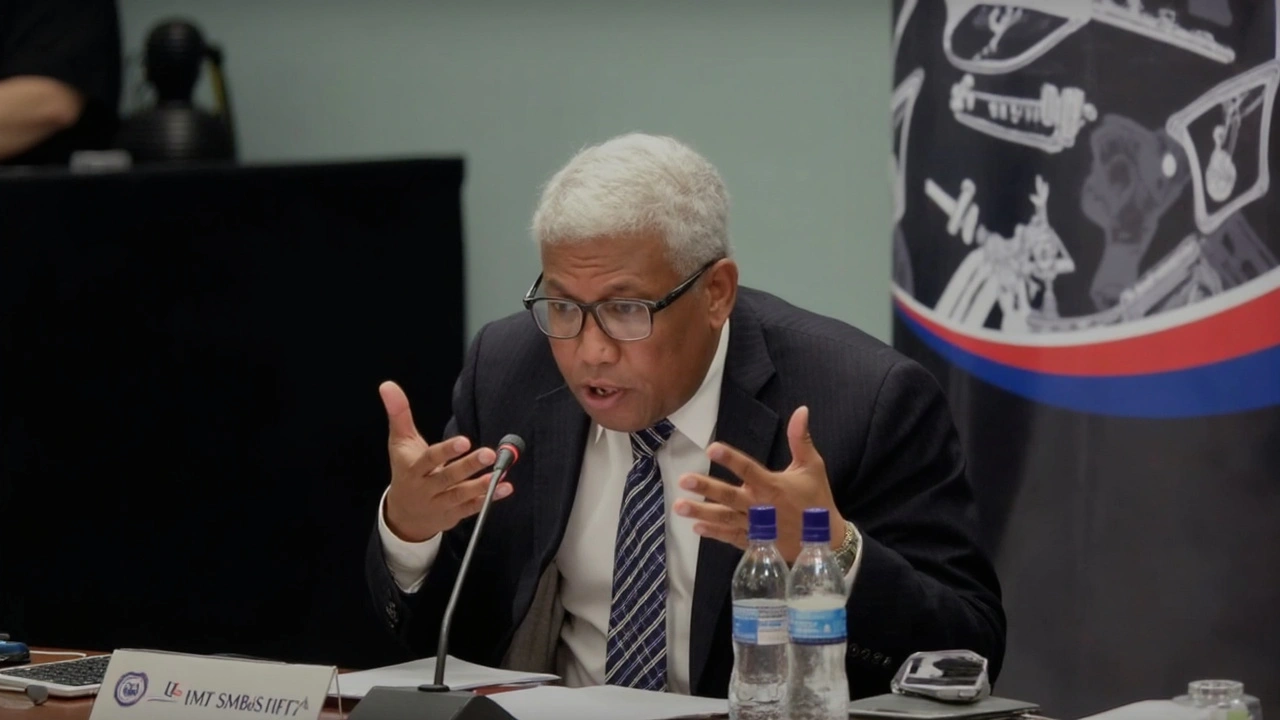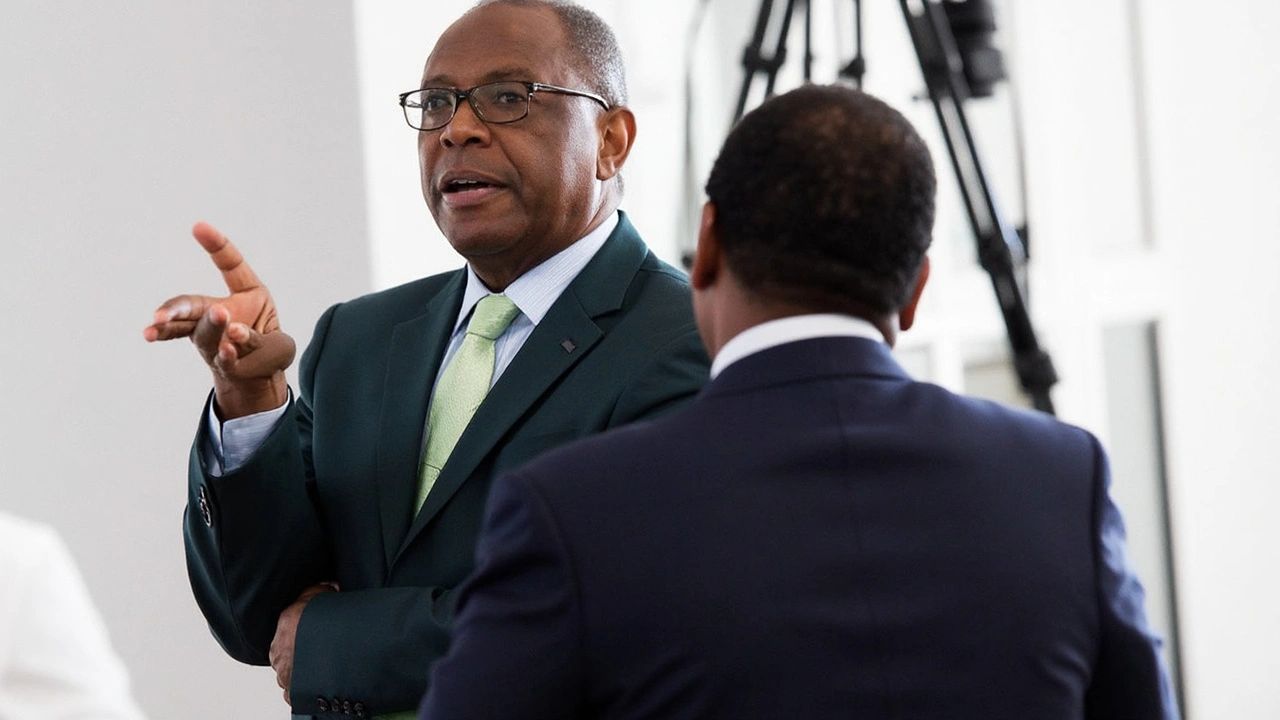Judge Mbenenge Faces Sexual Harassment Claims: The Story Unfolds
Eastern Cape Judge President Selby Mbenenge is in the spotlight as he defends himself at the Judicial Conduct Tribunal. His argument? He had a consensual and flirtatious relationship with court secretary Andiswa Mengo, and he says the accusations of sexual harassment don't fit what really happened between them.
Testifying under cross-examination, Mbenenge claimed that he pursued a romantic connection with Mengo and that she 'played along'—using the isiXhosa word 'Ukumtsa,' which he says means playful shyness designed to attract. He was quick to say that these cultural signals were badly misunderstood when filtered through a strict European lens often used in harassment cases. According to him, his persistence wouldn't have felt out of line if cultural nuances had been respected.
He didn't deny stepping over workplace boundaries, but insisted this was him acting as a 'social being,' not in his official role as Judge President. The way he tells it, requesting photos or commenting on her appearance wasn't for professional gain—it was personal appreciation. Every flirtatious message, he argues, got a response in kind, making it mutual rather than aggressive.

Two Versions of the Same Relationship
Mengo, however, described a different experience. She accuses Mbenenge of ongoing unwanted advances that crossed the line into clear sexual harassment—including, most shockingly, alleging that during a meeting in his office, he unzipped his pants and tried to get her to perform oral sex. Mbenenge firmly rejects this, calling it an outright lie and sticking to his version: any explicit chats or requests were just two adults communicating, not harassment.
The case gets thorny when you look at the power dynamics. Mbenenge is one of the province's top judges. Mengo is a court secretary. That can make things complicated when one party says the attention was fine and the other says it was unwanted. Advocate Salome Scheepers, leading the evidence for the tribunal, pressed Mbenenge hard about what real consent looks like when so much hierarchical power is at play. Is it really mutual when one person literally holds the keys to the other's career?
Mbenenge, clearly aware of the public fallout, did apologize—not for the nature of the relationship, but for private messages leaking into the public sphere. Yet he hasn’t budged on his basic defense: nothing he did was out of line, and the interactions were anything but one-sided.
This isn’t your run-of-the-mill workplace scandal. As the tribunal sessions continue, every message, gesture, and cultural nuance is being picked apart. It’s more than just a personal dispute. The way this case plays out could push courts everywhere to think harder about culture, power, and what actually counts as consent when the stakes are high.

6 Responses
It’s clear that power dynamics matter a lot in any workplace, especially in a courtroom setting.
When a judge cloaks his conduct in the language of “cultural nuance,” he may merely be hiding the abyss where consent evaporates.
Wow!!! This whole saga is a textbook case of how *power* can masquerade as *flirtation*!!! 😱🚨 The clerk’s voice seems drowned out by the judge’s “cultural” excuse, and that’s just not okay!!! 🙅♀️💥 We need to remember that consent isn’t a game of “who says what first”!!! 🌈✨
Oh, absolutely, Jill-because the legal world has always been a shining beacon of egalitarianism, right? 🙄 It’s almost adorable how the “cultural nuance” argument gets trotted out like a tired excuse for everything from late‑payment fees to outright abuse. In reality, the judge’s position gives him a *megaphone* that drowns out any genuine “flirt” coming from a subordinate. So sure, power dynamics matter… but only when they inconveniently expose a judge’s predatory behavior.
This is nothing short of a disgraceful abuse of authority.
I’ve been watching the headlines on this case like a binge‑watch of a courtroom drama that never gets a satisfying ending.
First off, the whole “consensual flirtation” defense feels like a script written by someone who never spent a day in a real office where a boss has the keys to your career.
Even if you give the judge the benefit of the doubt, the power imbalance is so massive that any “playful” gesture can’t be taken at face value.
The clerk’s description of the judge unzipping his pants in a meeting is not just a spicy rumor; it’s a concrete allegation that, if true, crosses every line you can think of.
From a legal standpoint, consent under duress is a myth because the subordinate is always under pressure to keep their job.
The judge’s reliance on the isiXhosa term “Ukumtsa” sounds like a convenient cultural shield, but culture doesn’t give anyone a free pass to ignore professional boundaries.
What’s more, the tribunal’s role is exactly to sift through these claims and decide if the power gap rendered any “flirting” inherently coercive.
I also can’t help but notice how the media loves to spin the story into a “cultural misunderstanding” narrative, as if that somehow absolves the behavior.
In other sectors, similar accusations would lead to immediate investigations and likely termination.
The fact that a judge can still sit on the bench while this unfolds highlights a systemic flaw in how judicial accountability is handled.
If the messages are as leaked as reported, the judge’s apology for the leak, not the conduct itself, shows where his priorities lie.
Meanwhile, the clerk, Andiswa Mengo, is left navigating a minefield of professional risk just to speak her truth.
Let’s be real: the outcome of this tribunal could set a precedent for how courts across the country treat power‑based harassment.
Whether they lean towards a lenient “cultural nuance” excuse or a firm condemnation of abuse will echo in every courtroom hallway.
So, I’m rooting for a decision that says no one, regardless of title, gets to hide behind culture when they cross the line.
And if the tribunal finally calls out the judge’s actions, maybe we’ll see a future where “consent” isn’t a buzzword that gets twisted to protect the powerful.